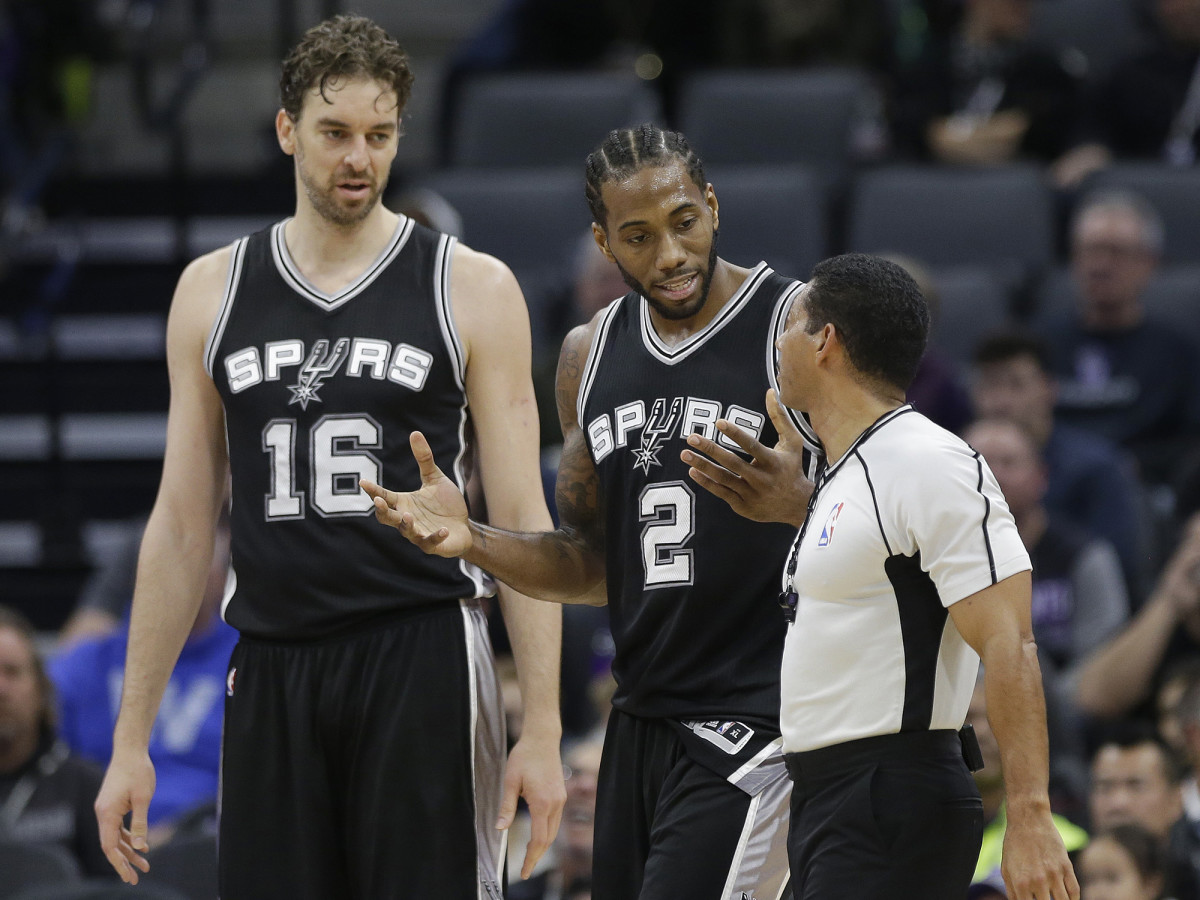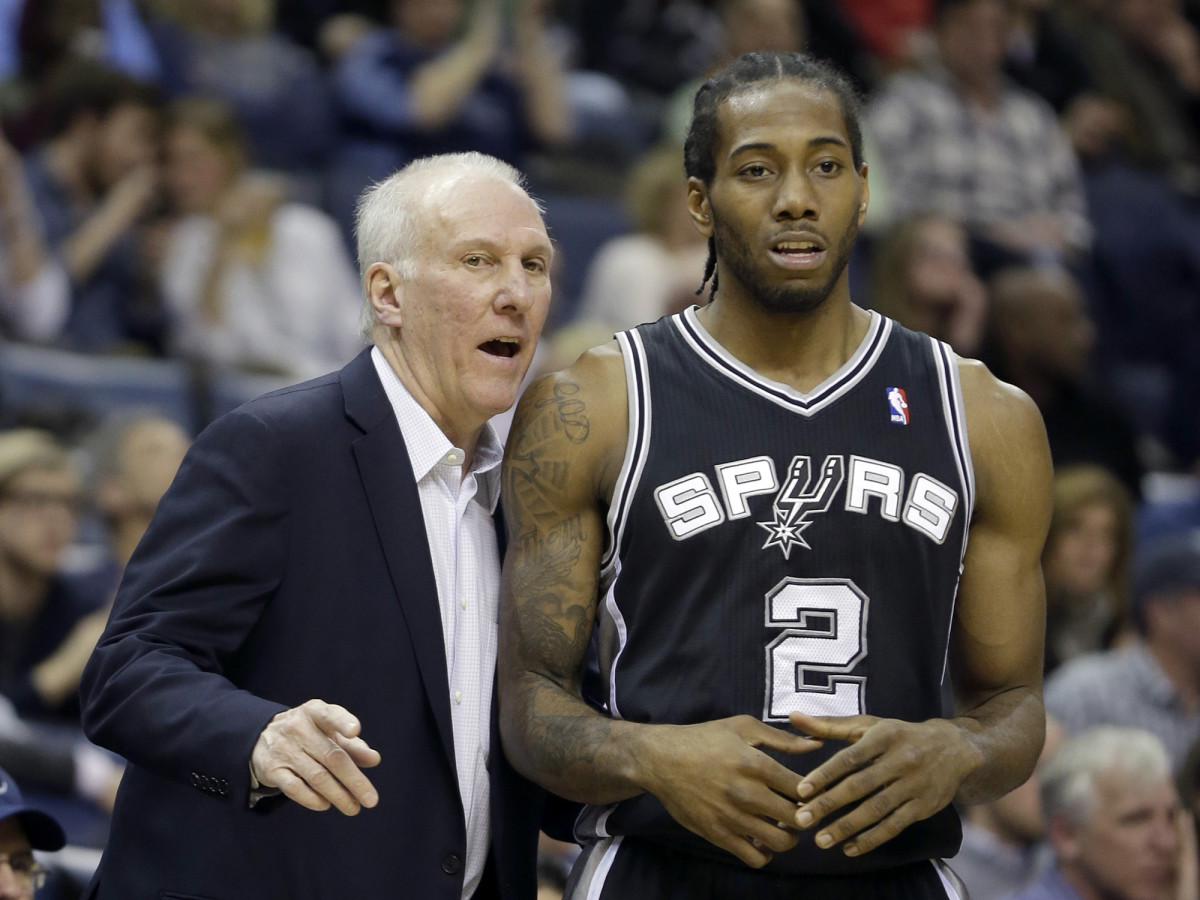Spurs' Title Contention More Complicated Than Ever

Nothing the Spurs do can be taken for granted this season, their first without an all-time great keeping play steady and emotions centered. The absence of Tim Duncan can be felt in certain moments. It can be glaring in the specter of particular matchups and instructive in understanding how San Antonio's current roster came to be. It might not define the Spurs in all that they are and do, though it has left them in a state of fragile contention.
All of San Antonio's big-picture credentials are in order: they've registered the second-best record in the league as quietly as ever, including just two losses in their last 20 games; their offense and defense, both carried by Kawhi Leonard, independently rank among the five or six best in the NBA; no team is better on the road (15–1); and no team has played better in the clutch.
Everything an NBA team does in the regular season comes in pursuit of such convincing bonafides. Those markers confirm San Antonio as a team of undeniable ability and rigor. Quality of execution remains a Spurs hallmark—as one expects it should under the guide of an expert coaching staff and creative front office. The shape of San Antonio's play has changed with Duncan gone, though even his retirement could not compromise the institutional standards he worked so hard to uphold.
2017 NBA All-Star: Five Players Worthy Of First-Time Selections
Still, everything that the Spurs have accomplished thus far weighs heavy with qualification. This is a very good team. It also comes in the wake of a great team that was unsettled in the 2016 playoffs in spectacular fashion. There is no way to view this current group but in the light of those failings; Oklahoma City won't be around to pose the same kind of challenge, but the limitations it exploited will nevertheless need to be rectified.
Competition at the highest levels of the league is ruthless in that way. The detail of playoff strategy is unforgiving and unrelenting. A flaw of a year ago remains that until proven otherwise, leaving San Antonio still months removed from any real opportunity to reconcile its previous deficits. Everything until then matters, but only to suggest around the outline of a verdict rather than to reveal one.
Regardless, it's clear that San Antonio already satisfies the most basic threshold of title contention: the ability to consistently dispatch lesser competition. Only a handful of teams seem even remotely likely to beat the Spurs in a seven-game series. Most others would be frustrated by Leonard's length, overwhelmed by San Antonio's depth, and exploited by the sheer variety of weapons Gregg Popovich has at his disposal. This is a team that can pivot its way to effective lineups and strategies against most opponents, even those that seem to be stylistic opposites. Popovich also has the organizational capital to make the kinds of critical adjustments that might cause other coaches problems. If closing a game with Patty Mills instead of Tony Parker makes the most sense, that's what the Spurs will do. If Danny Green isn't giving San Antonio what Pop believes it needs, then in comes Manu Ginobili or Jonathon Simmons.

Even with that uncertainty—or perhaps because of it—there's some real fight to this team. A democratic rotation has empowered one of the best benches in the league to run wild; not only does a combination of Mills, Ginobili, Simmons, David Lee, and Dewayne Dedmon have a bit too much of everything for most opposing reserves to handle, but each of those players can contribute sensibly within other, more controlled lineups. That bench unit plays fast and moves the ball; it is arguably the current Spurs at their Spursiest. But plug in Dedmon as a defensive alternative for Pau Gasol or Lee as a facilitator in place of LaMarcus Aldridge and the Spurs can unlock some situationally interesting dynamics.
That flexibility is a powerful thing in the regular season, particularly for a team this focused. It also doesn't much satisfy the implied burden of contention—that beating almost everybody might matter less than the ability to beat high-level peers when it matters. Elite NBA teams cannot operate in a vacuum. Every choice they make must come through the lens of understanding the particulars of their competition and moving in some way to create specific advantage. A contender doesn't want to tailor its entire approach to one opponent, but working toward championship viability means to setting a high, general baseline and building from there toward specific matchups and strategy.
The Spurs must operate through the lens of countering the Warriors and the Clippers. The latter is simpler in many respects, particularly if Blake Griffin is either out (as he will be when the two teams meet on Thursday) or in lesser form after he returns from injury. Griffin is the real source of L.A.'s dynamism; it's through his versatility that the Clippers create all kinds of problems for the Spurs, and by extension wedge open windows for Chris Paul, DeAndre Jordan, and J.J. Redick to make the most of their respective matchups. San Antonio simply has more survivable options if Griffin isn't that level of player. Even if he is, the Clipper defense has proven slightly vulnerable over the course of this season to both the kind of high-return isolation play the Spurs starters trade in and the flurries of ball movement characteristic of the bench.
2011 NBA Re-Draft: Fixing Lottery Mistakes
There also isn't a straightforward defensive matchup to occupy Leonard, which offers Popovich an interesting pivot point in his game planning. Should the situation call for it, Leonard could slide over to harass Paul or hound Redick—both of which are viable options to neutralize critical functions within the Clipper offense. Otherwise, a more relaxed individual matchup (against the likes of Luc Richard Mbah a Moute, Paul Pierce, or Austin Rivers) would give Leonard the freedom to roam and invaluable respite.
Part of the reason why San Antonio wilted the way it did against Oklahoma City was the weight of all Leonard had to carry. Picking up Kevin Durant and Russell Westbrook so consistently and operating as a primary creator is an untenable balance. Popovich made a show of dismissing that notion when the idea was raised this season:
"The bottom line is that he’s getting paid to do both," Popovich said. "So get your ass out there and do both, if you want to know the truth. If you don’t want to do both, then we’ll pay you $4 million."

In the regular season, this makes sense. But generating offense against fully engaged defenders operating with the benefit of granular scouting is a full-time job—even for a star as relentless as Leonard. You want to make the most of both his emerging offensive game and unique defensive ability. Pushing both to their limit in the playoffs while also driving up Leonard's minutes from his usual standard, while tempting, creates a sort of exponential drain—one that can be alleviated with even select minutes in less pressing matchups.
Golden State, by contrast, offers none. Durant, Draymond Green, Steph Curry, and Klay Thompson are too high a defensive priority to conceivably waste Leonard's talents on, say, Andre Iguodala. Leonard will have to lock in, he'll have to defend, and the Spurs will have to make do matching offense with the most potent scoring machine in the league. The Spurs' emphatic win in their season opener provides something of an outline—particularly if San Antonio's individual rebounders can be as effective in a playoff setting. So much of that game, though, reads as fluky considering how effortlessly they now work off of Durant and how steadily their defense has climbed.
And for all of Popovich's lineup flexibility, a matchup against the Warriors would really press the vulnerabilities of two needed veterans. Pau Gasol and Tony Parker start for a reason. Gasol, though, creates a swirl of complicating factors stemming from the harsh limits of his defensive range. Keeping up with Golden State means staying on the move. That's not really an option for Gasol, who is long enough to contest some shots inside but doesn't have the speed to consistently survive defending in space. San Antonio does as well as it can to hide this in the regular season. In the playoffs, it's a matchup the Warriors can really pick on—especially in cases where Parker (who can't really fight through screens anymore) is involved in tandem.
2017 NBA Draft Big Board 1.0: Markelle Fultz, Jayson Tatum Pace Rankings
Should the Spurs choose to close up those defensive weaknesses—say by giving some of Gasol's minutes to Dedmon and Parker's minutes to Mills (an average defender), as makes the most conventional sense—would they still score enough to keep up? The memorable scene of an overworked Leonard and off-and-on Aldridge grinding out futile possessions against the Thunder seems just as applicable here, particularly when the inherent math of the game does the Spurs no favors. San Antonio has been strong from mid-range and relies on Leonard, Aldridge, and Gasol to all knock down long twos at well-above-average levels. That reliance can catch up to a team—especially when the opponent in question is among the more prolific three-point shooting teams in the league and easily its most deadly.
If the Spurs continue to play big against the Warriors, they subject Gasol to a fluid, stretched offense that has found its internal balance or subject Dedmon to a high-leverage offensive role. If they go smaller (as was the case to close against Houston on Tuesday), they sacrifice one of their most notable advantages without giving themselves some particularly favorable perimeter matchup. The overwhelming problem in grappling with the Warriors is the fact that so few teams have enough capable perimeter defenders to stick Curry, Durant, and Thompson at the same time. San Antonio would be stuck with either Parker, Mills, or Ginobili at a position of disadvantage regardless of how its rotation bends. The only way to survive is to have playmakers on the floor, but for the Spurs to have playmakers on the floor leaves them open to poor defensive matchups.
And while Gasol might be a bit of a drag on the team defense, he is of particular help to Leonard. No Spur has assisted more of Leonard's makes this season. Gasol carries the offense some, he passes plenty, and his presence (somewhat counterintuitively) allows Leonard to get into the paint more often. Overall, Leonard scores notably more efficiently when he's able to work off of Gasol—an indicator of some of the subtle ways the Spaniard can counterbalance a superstar, even while the Spurs on the whole tend to score better with him off the floor.
That kind of relief matters—particularly if Leonard is going to hang with Durant or Curry for most of his minutes on the floor. There's simply no easy way out of that fundamental bind, and little means within this matchup to both involve Leonard offensively to the extent the Spurs would like while relying on him defensively to the extent they clearly need. That their championship hopes rest in that tension is what makes them so precarious. An sterling record, commendable balance, real depth, proven stars—and everything San Antonio hopes for still comes back to a single, overwhelming opponent.
